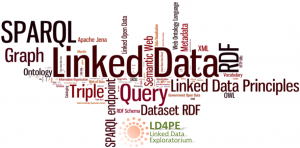Learning Resources & Proficiency Level Expectations
Many, if not most, of the competencies and benchmarks in the Competency Index for Linked Data can be achieved at varying levels of proficiency from the novice to the expert. Some competencies are mastered iteratively, with practitioners returning to the competency with different, advancing levels of mastery. Some competencies can be achieved only by people with considerable knowledge and experience.
Learning resources are usually developed for an audience of learners with expected level(s) of proficiency. The proficiency vocabulary defined here can be used in describing a learning resource to express the proficiency level (or range of levels) of the learners for which the resource is intended or useful.
NOTES:
- References below to “competency” include sets of competencies and benchmarks.
- The descriptions below are intended to provide a general sense of the level of proficiency of learners in relationship to knowledge and skills embodied in a learning resource. They are not intended to be prescriptive.
- Determination of the proficiency level of the “audience” for a learning resource is a subjective process and, at best, approximate. Frequently, the creators of a learning resource state in terms that can be mapped to this framework the levels of knowledge and skills of the learners that might benefit from engagement with the resource.
Proficiency Vocabulary
- Fundamental Awareness (Basic level): Persons in this class are beginning development of a knowledge and understanding of the common, basic techniques, and concepts. Focus is on learning.
- Novice (Limited experience): Persons in this class have the proficiency gained in a classroom and/or experimental scenarios or as a trainee on-the-job. Persons at this level of proficiency are expected to need help when performing the competency or set of competencies. Persons at this level are capable of understanding and can discuss terminology, concepts, principles, and issues related to this competency or set of competencies. Focus is on developing through experiment in application.
- Intermediate (Semi-independent practical application): Proficient persons in this class are able to successfully complete the tasks required by the competency or set of competencies. Help from an expert may be required from time to time, but the person can usually perform the skill(s) independently. Focus is on applying and enhancing knowledge or skill. Person may have applied this competency to situations occasionally while needing minimal guidance to perform successfully.
- Advanced (Applied theory): Persons in this class can perform the actions associated with this skill or skill set without assistance. Person is recognized within his or her immediate organization as “a person to ask” when difficult questions arise regarding this skill. Person is capable of coaching others in the application of this competency by translating complex nuances relating to this competency into easy to understand terms. Focus is on broad organizational/professional issues.
- Expert (Recognized Authority): Persons in this class are known as experts in this area. Persons can provide guidance, troubleshoot and answer questions related to this area of expertise and the field where the skill or skill set is used. Persons have created new applications for and/or lead the development of reference and resource materials for this competency. Persons are able to diagram or explain the relevant process elements and issues in relation to organizational trends in sufficient detail during discussions and presentations, to foster a greater understanding among internal and external colleagues and constituents. Focus is strategic.
Reference: Based on Office of Human Resources, U.S. National Institutes of Health: https://hr.od.nih.gov/workingatnih/competencies/proficiencyscale.htm

